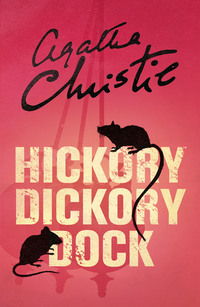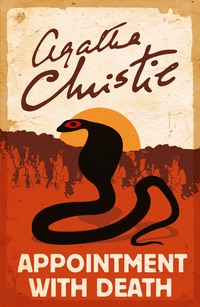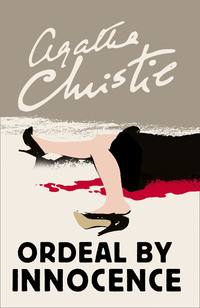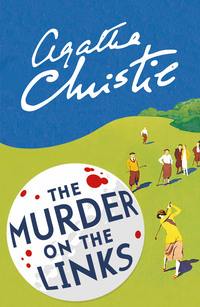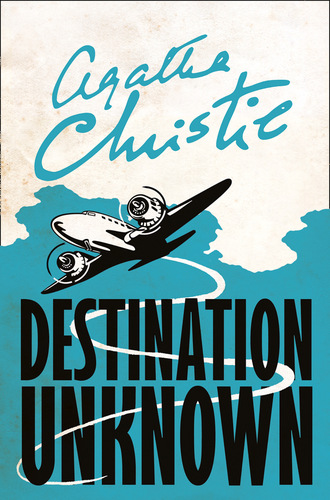
Полная версия
Destination Unknown
‘What’s his name?’
The voice at the other end coughed discreetly.
‘Well, I’m not exactly sure how you pronounce it, Mr Jessop. Perhaps I’d better spell it.’
‘Right. Go ahead.’
He jotted down on his blotter the letters as they came over the wire.
‘Polish?’ he said interrogatively, at the end.
‘He didn’t say, sir. He speaks English quite well, but with a bit of an accent.’
‘Ask him to wait.’
‘Very good, sir.’
Jessop replaced the telephone. Then he looked across at Olive Betterton. She sat there quite quietly with a disarming, hopeless placidity. He tore off the leaf on his desk pad with the name he had just written on it, and shoved it across to her.
‘Know anybody of that name?’ he asked.
Her eyes widened as she looked at it. For a moment he thought she looked frightened.
‘Yes,’ she said. ‘Yes, I do. He wrote to me.’
‘When?’
‘Yesterday. He’s a cousin of Tom’s first wife. He’s just arrived in this country. He was very concerned about Tom’s disappearance. He wrote to ask if I had had any news and—and to give me his most profound sympathy.’
‘You’d never heard of him before that?’
She shook her head.
‘Ever hear your husband speak of him?’
‘No.’
‘So really he mightn’t be your husband’s cousin at all?’
‘Well, no, I suppose not. I never thought of that.’ She looked startled. ‘But Tom’s first wife was a foreigner. She was Professor Mannheim’s daughter. This man seemed to know all about her and Tom in his letter. It was very correct and formal and—and foreign, you know. It seemed quite genuine. And anyway, what would be the point—if he weren’t genuine, I mean?’
‘Ah, that’s what one always asks oneself.’ Jessop smiled faintly. ‘We do it so much here that we begin to see the smallest thing quite out of proportion!’
‘Yes, I should think you might.’ She shivered suddenly. ‘It’s like this room of yours, in the middle of a labyrinth of corridors, just like a dream when you think you will never get out …’
‘Yes, yes, I can see it might have a claustrophobic effect,’ said Jessop pleasantly.
Olive Betterton put a hand up and pushed back her hair from her forehead.
‘I can’t stand it much longer, you know,’ she said. ‘Just sitting and waiting. I want to get away somewhere for a change. Abroad for choice. Somewhere where reporters won’t ring me up all the time, and people won’t stare at me. I’m always meeting friends and they keep asking me if I have had any news.’ She paused, then went on, ‘I think—I think I’m going to break down. I’ve tried to be brave, but it’s too much for me. My doctor agrees. He says I ought to go right away somewhere for three or four weeks. He wrote me a letter. I’ll show you.’
She fumbled in her bag, took out an envelope and pushed it across the desk to Jessop.
‘You’ll see what he says.’
Jessop took the letter out of the envelope and read it.
‘Yes,’ he said. ‘Yes, I see.’
He put the letter back in the envelope.
‘So—so it would be all right for me to go?’ Her eyes watched him nervously.
‘But of course, Mrs Betterton,’ he replied. He raised surprised eyebrows. ‘Why not?’
‘I thought you might object.’
‘Object—why? It’s entirely your own business. You’ll arrange it so that I can get in touch with you while you’re away in case any news should come through?’
‘Oh, of course.’
‘Where were you thinking of going?’
‘Somewhere where there is sun and not too many English people. Spain or Morocco.’
‘Very nice. Do you a lot of good, I’m sure.’
‘Oh, thank you. Thank you very much.’
She rose, excited, elated—her nervousness still apparent.
Jessop rose, shook hands with her, pressed the buzzer for a messenger to see her out. He went back to his chair and sat down. For a few moments his face remained as expressionless as before, then very slowly he smiled. He lifted the phone.
‘I’ll see Major Glydr now,’ he said.
CHAPTER 2
‘Major Glydr?’ Jessop hesitated a little over the name.
‘It is difficult, yes.’ The visitor spoke with humorous appreciation. ‘Your compatriots, they have called me Glider in the war. And now, in the States, I shall change my name to Glyn, which is more convenient for all.’
‘You come from the States now?’
‘Yes, I arrive a week ago. You are—excuse me—Mr Jessop?’
‘I’m Jessop.’
The other looked at him with interest.
‘So,’ he said. ‘I have heard of you.’
‘Indeed? From whom?’
The other smiled.
‘Perhaps we go too fast. Before you permit that I should ask you some questions, I present you first this letter from the US Embassy.’
He passed it with a bow. Jessop took it, read the few lines of polite introduction, put it down. He looked appraisingly at his visitor. A tall man, carrying himself rather stiffly, aged thirty or thereabouts. The fair hair was close cropped in the continental fashion. The stranger’s speech was slow and careful with a very definite foreign intonation, though grammatically correct. He was, Jessop noticed, not at all nervous or unsure of himself. That in itself was unusual. Most of the people who came into this office were nervous or excited or apprehensive. Sometimes they were shifty, sometimes violent.
This was a man who had complete command of himself, a man with a poker face who knew what he was doing and why, and who would not be easily tricked or betrayed into saying more than he meant to say. Jessop said pleasantly:
‘And what can we do for you?’
‘I came to ask if you had any further news of Thomas Betterton, who disappeared recently in what seems a somewhat sensational manner. One cannot, I know, believe exactly what one reads in the press, so I ask where I can go for reliable information. They tell me—you.’
‘I’m sorry, we’ve no definite information about Betterton.’
‘I thought perhaps he might have been sent abroad on some mission.’ He paused and added, rather quaintly, ‘You know, hush-hush.’
‘My dear sir.’ Jessop looked pained. ‘Betterton was a scientist, not a diplomat or a secret agent.’
‘I am rebuked. But labels are not always correct. You will want to inquire my interest in the matter. Thomas Betterton was a relation of mine by marriage.’
‘Yes. You are the nephew, I believe, of the late Professor Mannheim.’
‘Ah, that you knew already. You are well informed here.’
‘People come along and tell us things,’ murmured Jessop. ‘Betterton’s wife was here. She told me. You had written to her.’
‘Yes, to express my condolences and to ask if she had had any further news.’
‘That was very correct.’
‘My mother was Professor Mannheim’s only sister. They were very much attached. In Warsaw when I was a child I was much at my uncle’s house, and his daughter, Elsa, was to me like a sister. When my father and mother died my home was with my uncle and cousin. They were happy days. Then came the war, the tragedies, the horrors … Of all that we will not speak. My uncle and Elsa escaped to America. I myself remained in the underground Resistance, and after the war ended I had certain assignments. One visit I paid to see my uncle and cousin, that was all. But there came a time when my commitments in Europe are ended. I intend to reside in the States permanently. I shall be, I hope, near my uncle and my cousin and her husband. But alas’—he spread out his hands—‘I get there and my uncle, he is dead, my cousin, too, and her husband he has come to this country and has married again. So once more I have no family. And then I read of the disappearance of the well-known scientist Thomas Betterton, and I come over to see what can be done.’ He paused and looked inquiringly at Jessop.
Jessop looked expressionlessly back at him.
‘Why did he disappear, Mr Jessop?’
‘That,’ said Jessop, ‘is just what we’d like to know.’
‘Perhaps you do know?’
Jessop appreciated with some interest how easily their roles might become reversed. In this room he was accustomed to ask questions of people. This stranger was now the inquisitor.
Still smiling pleasantly, Jessop replied:
‘I assure you we do not.’
‘But you suspect?’
‘It is possible,’ said Jessop cautiously, ‘that the thing follows a certain pattern … There have been occurrences of this kind before.’
‘I know.’ Rapidly the visitor cited a half-dozen cases. ‘All scientists,’ he said, with significance.
‘Yes.’
‘They have gone beyond the Iron Curtain?’
‘It is a possibility, but we do not know.’
‘But they have gone of their own free will?’
‘Even that,’ said Jessop, ‘is difficult to say.’
‘It is not my business, you think?’
‘Oh, please.’
‘But you are right. It is of interest to me only because of Betterton.’
‘You’ll forgive me,’ said Jessop, ‘if I don’t quite understand your interest. After all, Betterton is only a relation by marriage. You didn’t even know him.’
‘That is true. But for us Poles, the family is very important. There are obligations.’ He stood up and bowed stiffly. ‘I regret that I have trespassed upon your time, and I thank you for your courtesy.’
Jessop rose also.
‘I’m sorry we cannot help you,’ he said, ‘but I assure you we are completely in the dark. If I do hear of anything can I reach you?’
‘Care of the US Embassy will find me. I thank you.’ Again he bowed formally.
Jessop touched the buzzer. Major Glydr went out. Jessop lifted the receiver.
‘Ask Colonel Wharton to come to my room.’
When Wharton entered the room Jessop said:
‘Things are moving—at last.’
‘How?’
‘Mrs Betterton wants to go abroad.’
Wharton whistled.
‘Going to join hubby?’
‘I’m hopeful. She came provided with a convenient letter from her medical adviser. Complete need of rest and change of scene.’
‘Looks good!’
‘Though, of course, it may be true,’ Jessop warned him. ‘A simple statement of fact.’
‘We never take that view here,’ said Wharton.
‘No. I must say she does her stuff very convincingly. Never slips up for a moment.’
‘You got nothing further from her, I suppose?’
‘One faint lead. The Speeder woman with whom Betterton lunched at the Dorset.’
‘Yes?’
‘He didn’t tell his wife about the lunch.’
‘Oh.’ Wharton considered. ‘You think that’s relevant?’
‘It might be. Carol Speeder was had up before the Committee of Investigation of un-American Activities. She cleared herself, but all the same … yes, all the same she was, or they thought she was, tarred with that brush. It may be a possible contact. The only one we’ve found for Betterton so far.’
‘What about Mrs Betterton’s contacts—any possible contact lately who could have instigated the going abroad business?’
‘No personal contact. She had a letter yesterday from a Pole. A cousin of Betterton’s first wife. I had him here just now asking for details, etc.’
‘What’s he like?’
‘Not real,’ said Jessop. ‘All very foreign and correct, got all the “gen”, curiously unreal as a personality.’
‘Think he’s been the contact to tip her off?’
‘It could be. I don’t know. He puzzles me.’
‘Going to keep tabs on him?’
Jessop smiled.
‘Yes. I pressed the buzzer twice.’
‘You old spider—with your tricks.’ Wharton became businesslike again. ‘Well, what’s the form?’
‘Janet, I think, and the usual. Spain, or Morocco.’
‘Not Switzerland?’
‘Not this time.’
‘I should have thought Spain or Morocco would have been difficult for them.’
‘We mustn’t underestimate our adversaries.’
Wharton flipped the security files disgustedly with his nail.
‘About the only two countries where Betterton hasn’t been seen,’ he said with chagrin. ‘Well, we’ll lay it all on. My God, if we fall down on the job this time—’
Jessop leaned back in his chair.
‘It’s a long time since I’ve had a holiday,’ he said. ‘I’m rather sick of this office. I might take a little trip abroad …’
CHAPTER 3
‘Flight 108 to Paris. Air France. This way please.’
The persons in the lounge at Heathrow Airport rose to their feet. Hilary Craven picked up her small, lizard-skin travelling case and moved in the wake of the others, out on to the tarmac. The wind blew sharply cold after the heated air of the lounge.
Hilary shivered and drew her furs a little closer round her. She followed the other passengers across to where the aircraft was waiting. This was it! She was off, escaping! Out of the greyness, the coldness, the dead numb misery. Escaping to sunshine and blue skies and a new life. She would leave all this weight behind, this dead weight of misery and frustration. She went up the gangway of her plane, bending her head as she passed inside and was shown by the steward to her seat. For the first time in months she savoured relief from a pain that had been so sharply acute as almost to be physical. ‘I shall get away,’ she said to herself, hopefully. ‘I shall get away.’
The roaring and the revolutions of the plane excited her. There seemed a kind of elemental savagery in it. Civilized misery, she thought, is the worst misery. Grey and hopeless. ‘But now,’ she thought, ‘I shall escape.’
The plane taxied gently along the runway. The air hostess said:
‘Fasten your belts, please.’
The plane made a half-turn and stood waiting its signal to depart. Hilary thought, ‘Perhaps the plane will crash … Perhaps it will never rise off the ground. Then that will be the end, that will be the solution to everything.’ They seemed to wait for ages out on the airfield. Waiting for the signal to start off to freedom, Hilary thought, absurdly: ‘I shall never get away, never. I shall be kept here—a prisoner …’
Ah, at last.
A final roar of engines, then the plane started forward. Quicker, quicker, racing along. Hilary thought: ‘It won’t rise. It can’t … this is the end.’ Ah, they were above the ground now, it seemed. Not so much that the plane rose as that the earth was falling away, dropping down, thrusting its problems and its disappointments and its frustrations beneath the soaring creature rising up so proudly into the clouds. Up they went, circling round, the aerodrome looking like a ridiculous child’s toy beneath. Funny little roads, strange little railways with toy trains on them. A ridiculous childish world where people loved and hated and broke their hearts. None of it mattered because they were all so ridiculous and so prettily small and unimportant. Now there were clouds below them, a dense, greyish-white mass. They must be over the Channel now. Hilary leaned back, closing her eyes. Escape. Escape. She had left England, left Nigel, left the sad little mound that was Brenda’s grave. All left behind. She opened her eyes, closed them again with a long sigh. She slept …
When Hilary awoke, the plane was coming down. ‘Paris,’ thought Hilary, as she sat up in her seat and reached for her handbag. But it was not Paris. The air hostess came down the car saying, with that nursery governess brightness that some travellers found so annoying:
‘We are landing you at Beauvais as the fog is very thick in Paris.’
The suggestion in her manner was: ‘Won’t that be nice, children?’ Hilary peered down through the small space of window at her side. She could see little. Beauvais also appeared to be wreathed in fog. The plane was circling round slowly. It was some time before it finally made its landing. Then the passengers were marshalled through cold, damp mist into a rough wooden building with a few chairs and a long wooden counter.
Depression settled down on Hilary but she tried to fight it off. A man near her murmured:
‘An old war aerodrome. No heating or comforts here. Still, fortunately, being the French, they’ll serve us out some drinks.’
True enough, almost immediately a man came along with some keys and presently passengers were being served with various forms of alcoholic refreshments to boost their morale. It helped to buoy the passengers up for the long and irritating wait.
Some hours passed before anything happened. Other planes appeared out of the fog and landed, also diverted from Paris. Soon the small room was crowded with cold, irritable people grumbling about the delay.
To Hilary it all had an unreal quality. It was as though she was still in a dream, mercifully protected from contact with reality. This was only a delay, only a matter of waiting. She was still on her journey—her journey of escape. She was still getting away from it all, still going towards that spot where her life would start again. Her mood held. Held through the long, fatiguing delay, held through the moments of chaos when it was announced, long after dark, that buses had come to convey the travellers to Paris.
There was then a wild confusion, of coming and going, passengers, officials, porters all carrying baggage, hurrying and colliding in the darkness. In the end Hilary found herself, her feet and legs icy cold, in a bus slowly rumbling its way through the fog towards Paris.
It was a long weary drive taking four hours. It was midnight when they arrived at the Invalides and Hilary was thankful to collect her baggage and drive to the hotel where accommodation was reserved for her. She was too tired to eat—just had a hot bath and tumbled into bed.
The plane to Casablanca was due to leave Orly Airport at ten-thirty the following morning, but when they arrived at Orly everything was confusion. Planes had been grounded in many parts of Europe, arrivals had been delayed as well as departures.
A harassed clerk at the departure desk shrugged his shoulders and said:
‘Impossible for Madame to go on the flight where she had reservations! The schedules have all had to be changed. If Madame will take a seat for a little minute, presumably all will arrange itself.’
In the end she was summoned and told that there was a place on a plane going to Dakar which normally did not touch down at Casablanca but would do so on this occasion.
‘You will arrive three hours later, that is all, Madame, on this later service.’
Hilary acquiesced without protest and the official seemed surprised and positively delighted by her attitude.
‘Madame has no conceptions of the difficulties that have been made to me this morning,’ he said. ‘Enfin, they are unreasonable, Messieurs the travellers. It is not I who made the fog! Naturally it has caused the disruptions. One must accommodate oneself with the good humour—that is what I say, however displeasing it is to have one’s plans altered. Après tout, Madame, a little delay of an hour or two hours or three hours, what does it matter? How can it matter by what plane one arrives at Casablanca.’
Yet on that particular day it mattered more than the little Frenchman knew when he spoke those words. For when Hilary finally arrived and stepped out into the sunshine on to the tarmac, the porter who was moving beside her with his piled-up trolley of luggage observed:
‘You have the lucky chance, Madame, not to have been on the plane before this, the regular plane for Casablanca.’
Hilary said: ‘Why, what happened?’
The man looked uneasily to and fro, but after all, the news could not be kept secret. He lowered his voice confidentially and leant towards her.
‘Mauvaise affaire!’ he muttered. ‘It crashed—landing. The pilot and the navigator are dead and most of the passengers. Four or five were alive and have been taken to hospital. Some of those are badly hurt.’
Hilary’s first reaction was a kind of blinding anger. Almost unprompted there leapt into her mind the thought, ‘Why wasn’t I in that plane? If I had been, it would have been all over now—I should be dead, out of it all. No more heartaches, no more misery. The people in that plane wanted to live. And I—I don’t care. Why shouldn’t it have been me?’
She passed through the Customs, a perfunctory affair, and drove with her baggage to the hotel. It was a glorious, sunlit afternoon, with the sun just sinking to rest. The clear air and golden light—it was all as she had pictured it. She had arrived! She had left the fog, the cold, the darkness of London; she had left behind her misery and indecision and suffering. Here there was pulsating life and colour and sunshine.
She crossed her bedroom and threw open the shutters, looking out into the street. Yes, it was all as she had pictured it would be. Hilary turned slowly away from the window and sat down on the side of the bed. Escape, escape! That was the refrain that had hummed incessantly in her mind ever since she left England. Escape. Escape. And now she knew—knew with a horrible, stricken coldness, that there was no escape.
Everything was just the same here as it had been in London. She herself, Hilary Craven, was the same. It was from Hilary Craven that she was trying to escape, and Hilary Craven was Hilary Craven in Morocco just as much as she had been Hilary Craven in London. She said very softly to herself:
‘What a fool I’ve been—what a fool I am. Why did I think that I’d feel differently if I got away from England?’
Brenda’s grave, that small pathetic mound, was in England and Nigel would shortly be marrying his new wife in England. Why had she imagined that those two things would matter less to her here? Wishful thinking, that was all. Well, that was all over now. She was up against reality. The reality of herself and what she could bear, and what she could not bear. One could bear things, Hilary thought, so long as there was a reason for bearing them. She had borne her own long illness, she had borne Nigel’s defection and the cruel and brutal circumstances in which it had operated. She had borne these things because there was Brenda. Then had come the long, slow, losing fight for Brenda’s life—the final defeat … Now there was nothing to live for any longer. It had taken the journey to Morocco to prove that to her. In London she had had a queer, confused feeling that if only she could get somewhere else she could forget what lay behind her and start again. And so she had booked her journey to this place which had no associations with the past, a place quite new to her which had the qualities she loved so much: sunlight, pure air and the strangeness of new people and things. Here, she had thought, things will be different. But they were not different. They were the same. The facts were quite simple and inescapable. She, Hilary Craven, had no longer any wish to go on living. It was as simple as that.
If the fog had not intervened, if she had travelled on the plane on which her reservations had been made, then her problem might have been solved by now. She might be lying in some French official mortuary, a body broken and battered with her spirit at peace, freed from suffering. Well, the same end could be achieved, but she would have to take a little trouble.
It would have been so easy if she had had sleeping-stuff with her. She remembered how she had asked Dr Grey and the rather queer look on his face as he had answered:
‘Better not. Much better to learn to sleep naturally. May be hard at first, but it will come.’
A queer look on his face. Had he known then or suspected that it would come to this? Oh, well, it should not be difficult. She rose to her feet with decision. She would go out now to a chemist’s shop.
Hilary had always imagined that drugs were easy to buy in foreign cities. Rather to her surprise, she found that this was not so. The chemist she went to first supplied her with only two doses. For more than that amount, he said, a doctor’s prescription would be advisable. She thanked him smilingly and nonchalantly and went rather quickly out of the shop, colliding as she did so with a tall, rather solemn-faced young man, who apologized in English. She heard him asking for toothpaste as she left the shop.


